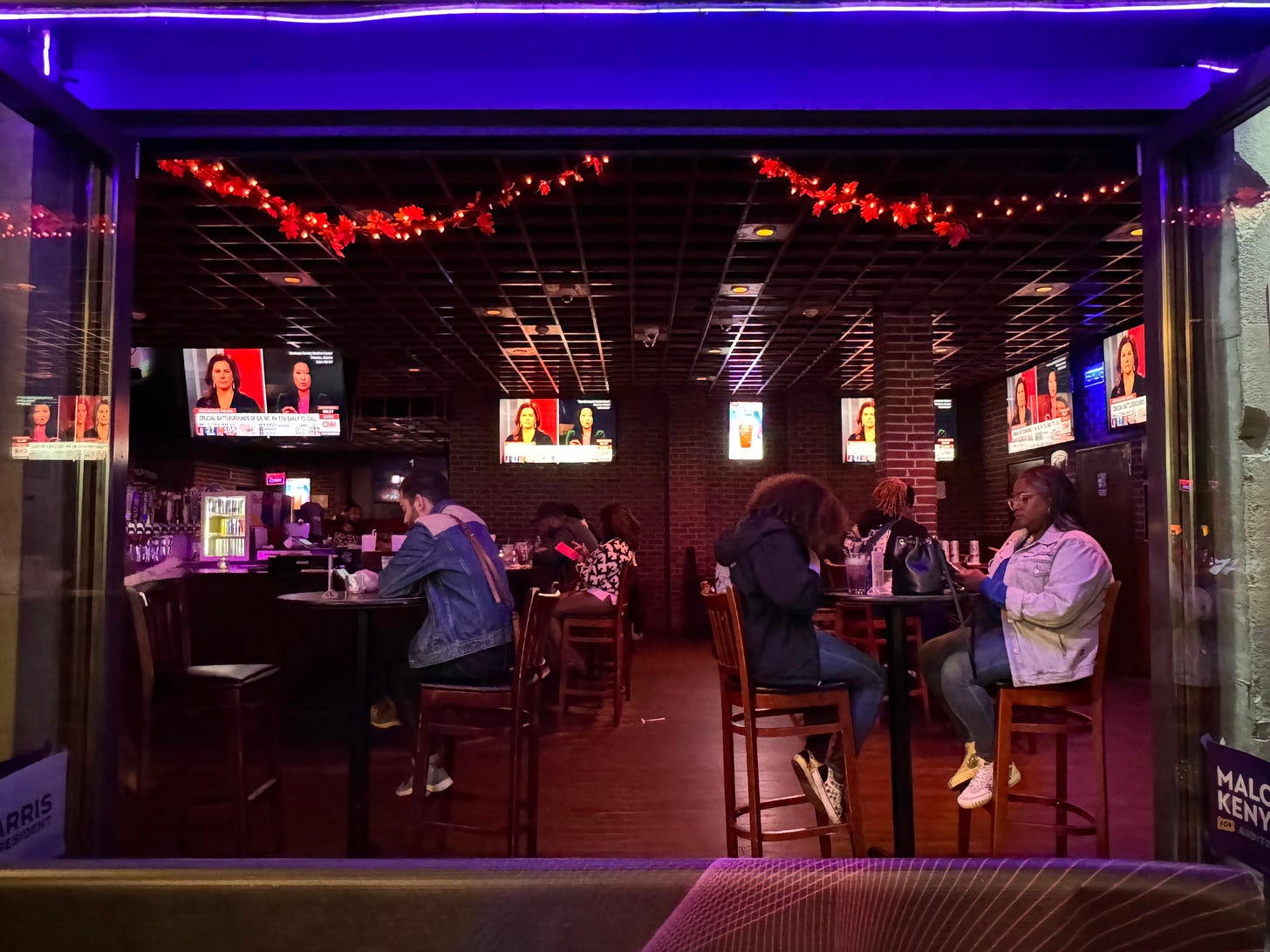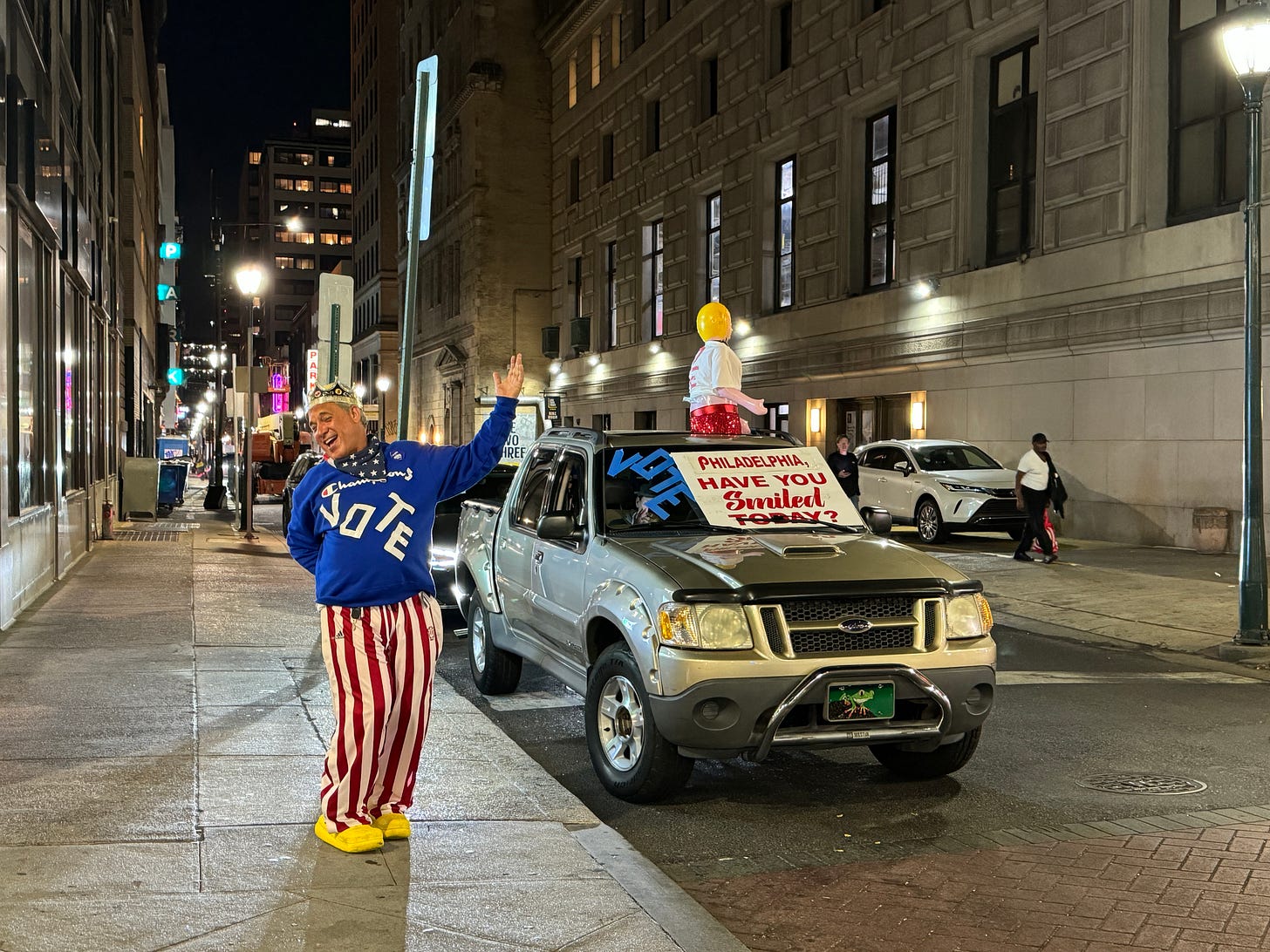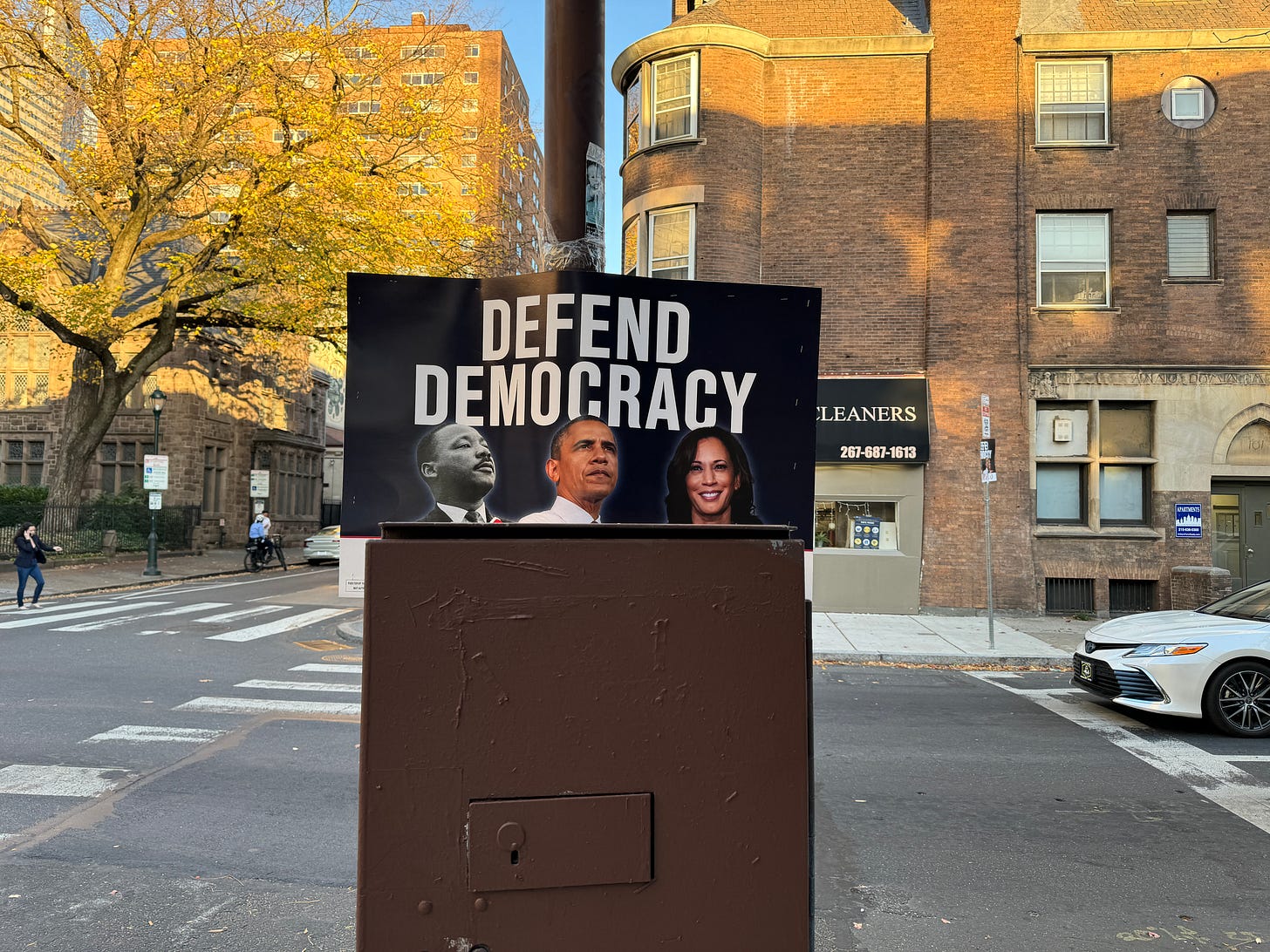“Emotional support margaritas” were on sale for happy hour prices at Mission Taqueria, as voters in Philadelphia sat through a tense election night. They looked down at glowing electoral maps on their cell phones and talked with friends, trying not to worry. They told me they voted with no problem, after being inundated by texts on their cell phones, canvassers at their homes, and political ads on TV. It was “annoying” how much they were bombarded before Nov. 5.
At another bar, Woody’s, Philadelphians sat quiet and still, watching CNN on the TVs and staring at their phones. In a few hours, former President Donald Trump would decisively win their battleground state with its 19 precious electoral votes, guaranteeing his path to victory. And so began Philadelphia’s collective hangover in the morning — a sobering day for the city’s Democrats who were outnumbered by the state’s Republicans.
“What is there even to say?” a pierced and tattooed barista asked me at 6am as he made a cappuccino.
“Not a good day. Like, how the fuck did this happen?” asked Peggy, a retired physician and longtime Philadelphian. It turns out that reproductive rights really didn’t matter at all. “I feel like I’m in a dystopian world,” she said.
A doctor in scrubs, walking home from a night shift at a local hospital, stood with me on the sidewalk to talk about Trump. “It's just kind of surprising that he won by so much. I think there was always this thought that it could be razor close but it turns out it wasn't that close after all,” he said. “It's kind of weird to me that we want to go back to what that is. But, you know, the country voted and that's the result.”
Disinformation hits Pennsylvania hard
On social media, the founder and former leader of the controversial Project Veritas, James O’Keefe, had cast doubt on the integrity of Philadelphia’s poll supervisors and falsely claimed that the City Commissioners’ Office told non-citizens “they could vote if they are Philadelphia residents.”
Philadelphia City Commissioner Seth Bluestein told me on Tuesday afternoon, “James O’Keefe is the only disinformation efforts I’m seeing right now.”
But the narrative was picked up by right-wing media outlet Gateway Pundit. Then came Trump’s post on Truth Social: “A lot of talk about massive CHEATING in Philadelphia. Law Enforcement coming!!!”
Then O’Keefe claimed that in Bethlehem, “an election judge was found alone in a room, seemingly handling ballots without the required oversight,” potentially in violation of state law. Where was he getting all this? O’Keefe had assembled a collection of election workers and poll monitors who had vowed to secretly film voting and ballot counting across the United States, according to records obtained by New York Times reporter Ken Bensinger.
But after Trump’s victory in Pennsylvania, O’Keefe dropped his complaints of injustice. Sitting calmly on a bench in the night, he declared, “The world is different now. Things are going to change.”
The state was targeted with disinformation in the weeks leading up to Election Day. Last week, intelligence officials announced that Russian actors were behind a fake video purporting to show ballots being destroyed in Pennsylvania. The video was purportedly from Bucks County — the state’s fourth-most populous county, and a primarily white community (80%) where less than half (44%) hold college degrees, according to census data.
The intelligence community assessed that Russia was channeling disinformation here in addition to other swing states. They knew Pennsylvania was a priority. On Election Day, the FBI warned that a fabricated video featuring a fake FBI press release claimed that prison managers in Pennsylvania — as well as other swing states — rigged inmate voting and colluded with a political party.
Pennsylvania’s extremists lie in wait
On the eve of Election Day, Philadelphia District Attorney Larry Krasner came out with a blunt message. “Anybody who thinks it's time to play militia, F around and find out. Anybody who thinks it's time to insult, to deride, to mistreat, to threaten people, F around and find out.”
And experts who track extremist activity on the far right and left told me that these communities were hanging back, before America chose Trump.
But University of Pittsburgh professor Michael Kenney said Pennsylvania’s anarchists and anti-fascists are preparing to be targeted by Trump’s wrath. “They're not telling me, ‘If Trump goes X, I'm going to strap a bomb to my body and detonate it in downtown D.C.,’” Michael said. “They're willing to say things like, ‘If Trump is elected and he comes after us, we will have a decision to make on whether we want to escalate our violence.’”
Michael tells me it comes down to whether or not the police crack down on them under Trump. “It could start as property damage,” he says. Maybe Molotov cocktails, torched cars. “And I think potentially it could escalate to anti-personnel violence against the police.”
Michael speaks directly with a few of them, even though he was doxxed and disavowed by some in the midst of his field research. He says they could also get into skirmishes with far-right groups like Proud Boys or Patriot Front. “The way they engage in their violence, it tends to be reciprocal. So if they know that the Proud Boys are going to go to a protest with knives, they'll bring knives and so forth.”
On the far right, Heidi Beirich, co-founder of Global Project Against Hate and Extremism, told me she was seeing nasty online chatter from the Proud Boys but no plans to deploy. Before Trump won, like O’Keefe, they were questioning the integrity of the election.
“The election denial narratives — that voting machines are connected to the Internet, ballots are being flipped intentionally, this kind of stuff that's being spread by people like [CEO of MyPillow Mike] Lindell and [former Republican politician Cleta] Mitchell — that mostly has been accepted by white supremacists,” she said. “They believe the vote is rigged.”
Some experts believed white supremacists would have come out if Trump had told them to mobilize.
FBI’s national election command post stays open
It was in Philadelphia that Trump and Vice President Kamala Harris met for the first time on a stage in September, for their one and only presidential debate.
On Monday before Election Day, both candidates docked more time in the state. Trump went to Reading and Pittsburgh, talking up the endorsement of Roberto Clemente Jr., the son of a famous Puerto Rican who played for the Pittsburgh Pirates. Harris ended her campaign at the Philadelphia Museum of Art, at the famous “Rocky steps” where Sylvester Stallone jogged up, threw punches, and danced around victoriously. (“Any chance you’re registered in Pennsylvania?” she had joked to Maya Rudolph on SNL over the weekend.)
With all of the attention on the city and state, I asked the Philadelphia Police Department how they were preparing. “We do not discuss our deployments,” a public affairs officer told me.
The FBI’s Philadelphia field office had shared more. “We gather and analyze intelligence to determine whether individuals might be motivated to take violent action for any reason, including due to concerns about the election,” Wayne Jacobs, Special Agent in Charge of the Philadelphia field office, told me in an emailed statement.
Their command post was sharing intelligence and criminal information with the FBI’s national election command post in Washington, D.C. The command post opened shop on Nov. 1 and will operate until at least Nov. 9, with some 80 personnel from the FBI and about a dozen partner agencies.
The effort started earlier than in previous years and “is a little more robust than it's been in the past,” said James Barnacle, deputy assistant director of the FBI’s Criminal Investigative Division. They continue to track federal election crimes, threats to election workers, foreign influence operations, cyber threats, and acts of domestic terrorism.
So far, at least among Philadelphians I spoke to who wished the country was moving in a different direction, there is incredulity but acceptance.







